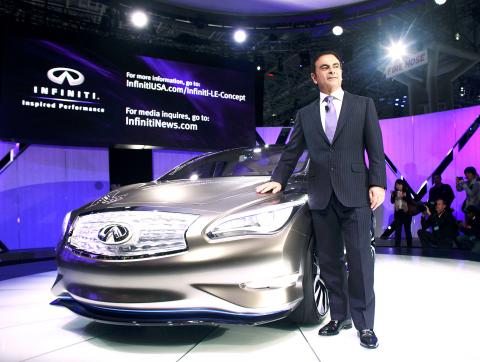Luxury automaker Infiniti yesterday said it would manufacture cars in China for the first time starting in 2014, joining a rush by global automakers to expand production in the world’s biggest auto market even as sales growth fades.
Infiniti, owned by Nissan Motor Co, said two of its models would be produced in factories run by Nissan and its Chinese joint-venture partner. It will be Infiniti’s first production outside Japan.
“For the brand to reach its aggressive sales target of 500,000 units by 2016, local production in the world’s largest automobile market is not an option but a necessity to our success,” Andy Palmer, executive vice president of the Global Infiniti & Luxury Business Unit, said in a statement.

Photo: Reuters
Growth in China’s vehicle sales plunged from an eye-popping 35 percent in 2010 to just 2.5 percent last year as the economy slowed. That is forecast to rebound to about 5 percent this year — stronger than the US or Europe, but a challenge for automakers that added new assembly lines during the boom, leading to a glut of supplies.
Also this week, Ford Motor Co said it would build a US$760 million auto assembly plant in Hangzhou, part of plans to double its China capacity to 1.2 million vehicles a year.

To many, Tatu City on the outskirts of Nairobi looks like a success. The first city entirely built by a private company to be operational in east Africa, with about 25,000 people living and working there, it accounts for about two-thirds of all foreign investment in Kenya. Its low-tax status has attracted more than 100 businesses including Heineken, coffee brand Dormans, and the biggest call-center and cold-chain transport firms in the region. However, to some local politicians, Tatu City has looked more like a target for extortion. A parade of governors have demanded land worth millions of dollars in exchange

An Indonesian animated movie is smashing regional box office records and could be set for wider success as it prepares to open beyond the Southeast Asian archipelago’s silver screens. Jumbo — a film based on the adventures of main character, Don, a large orphaned Indonesian boy facing bullying at school — last month became the highest-grossing Southeast Asian animated film, raking in more than US$8 million. Released at the end of March to coincide with the Eid holidays after the Islamic fasting month of Ramadan, the movie has hit 8 million ticket sales, the third-highest in Indonesian cinema history, Film

BIG BUCKS: Chairman Wei is expected to receive NT$34.12 million on a proposed NT$5 cash dividend plan, while the National Development Fund would get NT$8.27 billion Taiwan Semiconductor Manufacturing Co (TSMC, 台積電), the world’s largest contract chipmaker, yesterday announced that its board of directors approved US$15.25 billion in capital appropriations for long-term expansion to meet growing demand. The funds are to be used for installing advanced technology and packaging capacity, expanding mature and specialty technology, and constructing fabs with facility systems, TSMC said in a statement. The board also approved a proposal to distribute a NT$5 cash dividend per share, based on first-quarter earnings per share of NT$13.94, it said. That surpasses the NT$4.50 dividend for the fourth quarter of last year. TSMC has said that while it is eager

‘IMMENSE SWAY’: The top 50 companies, based on market cap, shape everything from technology to consumer trends, advisory firm Visual Capitalist said Taiwan Semiconductor Manufacturing Co (TSMC, 台積電) was ranked the 10th-most valuable company globally this year, market information advisory firm Visual Capitalist said. TSMC sat on a market cap of about US$915 billion as of Monday last week, making it the 10th-most valuable company in the world and No. 1 in Asia, the publisher said in its “50 Most Valuable Companies in the World” list. Visual Capitalist described TSMC as the world’s largest dedicated semiconductor foundry operator that rolls out chips for major tech names such as US consumer electronics brand Apple Inc, and artificial intelligence (AI) chip designers Nvidia Corp and Advanced